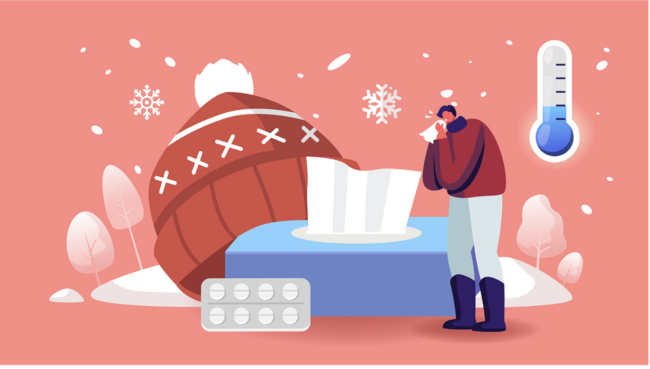Every winter, the sound of coughing echoes through Fieldston’s hallways. Sniffling students push through their days, unwilling to miss class despite feeling unwell. But why do so many of us seem to get sick in the winter? How do the pressures of Fieldston’s coursework contribute to the spread of illness?
As winter drags on, reduced sunlight is one major reason for increased sickness. With less sun exposure, our bodies produce less vitamin D, a key nutrient that supports the immune system. A lack of vitamin D weakens the immune system, making it harder for the body to fight off illness. As a result, students are more vulnerable to sickness during the winter months. Yanling Li (Form IV) explains, “I generally get more sick in the winter,” noting that she feels her “immune system is very flimsy.” Similarly, Charlotte Stabenau, an English teacher at Fieldston, shared, “For the past couple of years, I have been getting sick every winter.”
The cold weather drives people indoors, where close quarters allow airborne germs to spread more easily. In a crowded school environment, illnesses circulate more rapidly. Colleen Meehan, a nurse at Fieldston, believes this is a major factor in the rise of sickness, saying, “It’s because kids are indoors more.”
Additionally, the dry air in winter helps preserve viruses and bacteria by keeping them in the air longer. This increases the likelihood of germs spreading and being inhaled by others.
While winter and the cold naturally bring more illness, Fieldston’s rigorous coursework pressures students to attend school even when they’re sick. Ms. Stabenau observed, “A lot of kids make an effort to come to school, then find that they can’t learn because they feel so sick,” adding, “You can’t think straight if you’re sick.” Juliet Lipman (Form V) explained, “Missing one day at Fieldston is really hard. There is so much to cover in a day, and as much as you want to prioritize your health, it can be pretty nerve-wracking to miss something in class and then need to make it up.” Jeein Chung (Form V) added, “There is so much work and information thrown at you in just one day.” Because of the fear of missing out on important material, Fieldston students often push through illness. Arden Sehgal (Form IV) summed it up: “I would rather be dying at school from a cold than at home missing an important lesson.”
This determination to attend school when sick has consequences, not just for the students but for everyone around them. Chung shared how being sick affects her academic performance: “Your physical wellness while sitting in a classroom and trying to digest information can be overridden by your headache or nausea.” Lipman added, “It’s so much harder to pay attention when you’re sick.” However, Ms. Stabenau stressed, “Staying home when you are sick is not just good for you; it’s good for everybody else.”
As illness spreads rapidly this winter, it is essential to prioritize health, both your own and that of others. Kerri Peyton, another nurse at Fieldston, emphasized, “Students come to school when they are sick because of the rigorous curriculum, but we try to tell students to go home because we want to prevent the spread of infection.” The nurses at Fieldston are making efforts to reduce the spread of illness, but students need to recognize when they are too sick to attend school. Ultimately, prioritizing health isn’t just an individual choice–it’s a communal responsibility. As winter illnesses spread, staying home when you’re sick isn’t a sign of weakness but a step toward protecting everyone.






